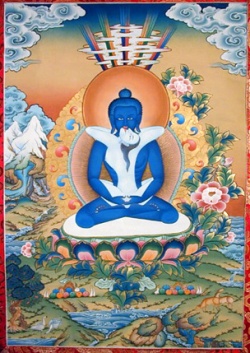Difference between revisions of "Adibuddha"
| Line 1: | Line 1: | ||
[[File:ATRIMOND1A.jpg|thumb|250px|]] | [[File:ATRIMOND1A.jpg|thumb|250px|]] | ||
| + | |||
| + | |||
| + | |||
| + | |||
| + | |||
[[Adibuddha]] (S): The original [[Buddha]], [[eternal]] with no beginning and with no end. | [[Adibuddha]] (S): The original [[Buddha]], [[eternal]] with no beginning and with no end. | ||
| − | |||
| − | + | [[Adibuddha]]: A concept in [[Mahayana Buddhism]] of an [[eternal Buddha]] with no beginning and with no end. He is self-created and originally revealed himself in the form of a blue flame coming out of a [[lotus]]. Over time this symbol became personified in the form of the [[Adibuddha]]. | |
| + | |||
| − | |||
| − | + | In [[Mahayana Buddhism]], the [[idea]] evolved, probably inspired by the [[monotheism]] of {{Wiki|Islam}}, that ultimately there is only one [[absolute]] [[power]] that creates itself. He is [[infinite]], self-created and originally revealed himself in the [[form]] of a blue flame coming out of a [[lotus]]. Over [[time]] this [[symbol]] was also personified in the [[form]] of the [[Adibuddha]]. | |
| − | The First or [[Original Buddha]]. The [[primordial and eternal Buddha]] with no beginning or end. | + | There are various [[forms]] and [[manifestations]] in which this [[supreme]] [[essence]] of [[Buddhahood]] becomes [[manifest]].The First or [[Original Buddha]]. The [[primordial and eternal Buddha]] with no beginning or end. |
He is self-created and originally revealed himself in the [[form]] of a blue flame coming out of a [[lotus]]. | He is self-created and originally revealed himself in the [[form]] of a blue flame coming out of a [[lotus]]. | ||
| − | |||
Over [[time]] this [[symbol]] became personified in the [[form]] of the [[Adibuddha]]. | Over [[time]] this [[symbol]] became personified in the [[form]] of the [[Adibuddha]]. | ||
In [[Tibetan Buddhism]], the [[Adibuddha]] is variously referred to as [[Vajradhara]] or [[Samantabhadra]]/[[Samantabhadri]] (these [[being]] a male-female pair). | In [[Tibetan Buddhism]], the [[Adibuddha]] is variously referred to as [[Vajradhara]] or [[Samantabhadra]]/[[Samantabhadri]] (these [[being]] a male-female pair). | ||
| + | |||
| + | |||
| + | |||
{{R}} | {{R}} | ||
[[Category:Buddhist Terms]] | [[Category:Buddhist Terms]] | ||
Revision as of 16:10, 23 September 2018
Adibuddha (S): The original Buddha, eternal with no beginning and with no end.
Adibuddha: A concept in Mahayana Buddhism of an eternal Buddha with no beginning and with no end. He is self-created and originally revealed himself in the form of a blue flame coming out of a lotus. Over time this symbol became personified in the form of the Adibuddha.
In Mahayana Buddhism, the idea evolved, probably inspired by the monotheism of Islam, that ultimately there is only one absolute power that creates itself. He is infinite, self-created and originally revealed himself in the form of a blue flame coming out of a lotus. Over time this symbol was also personified in the form of the Adibuddha.
There are various forms and manifestations in which this supreme essence of Buddhahood becomes manifest.The First or Original Buddha. The primordial and eternal Buddha with no beginning or end.
He is self-created and originally revealed himself in the form of a blue flame coming out of a lotus. Over time this symbol became personified in the form of the Adibuddha.
In Tibetan Buddhism, the Adibuddha is variously referred to as Vajradhara or Samantabhadra/Samantabhadri (these being a male-female pair).
